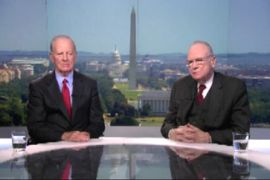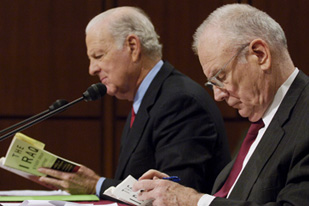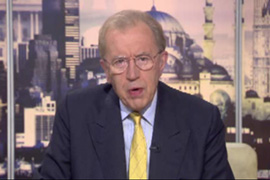
James Baker & Lee Hamilton 08.12.06
The co-chairs of the Iraq Study Group discuss their recommendations.
 |
| James Baker, left, and Lee Hamilton read through their report as they testify before the Senate Armed Services Committee in Washington [EPA] |
Sir David Frost: To help us explore the findings [of the Iraq Study Group bi-partisan report, which investigated the progress of the US-led campaign in Iraq], we are joined by its co-chairs, former secretary of state James Baker, and former democratic congressman Lee Hamilton.
Lee Hamilton: I think the situation on the ground was really worse than we had anticipated. The violence was increasing, the hardship and suffering of the people increasing, and we were all quite shocked at the direction of events. We thought that the situation was one of growing violence, higher casualties for American forces and, of course, increasing deterioration in the country.
So the trip to Baghdad was a very important trip for us – not just in terms of the interviews that we had, but in observing at least the environs of Baghdad.
James Baker: We spent most of our time in the Green Zone, with the exception of former senator Chuck Robb, a member of our panel. He went, I think, to Anbar province. We were told when we questioned the opportunity to go outside the Green Zone that while [the security services] could do that for us, they would recommend against it. The security officer recommended strongly against it.
And we decided well, if that is the case we have all spent a lot of time in government here in Washington, we would follow that advice simply because we didn’t want to get back to Washington and have stories circulating in the press that somehow we were trying to cowboy it in Baghdad.
Now we probably could have gone outside the Green Zone and been perfectly alright, but that is the way we played it. But the situation was a lot more difficult than we thought it was.
DF: You had urged very much in terms of dialogue with Syria for instance, talks that would take place without delay and without pre-conditions. Now that is the only part that the [US] president has so far commented on in the report. Were you dissappointed with his response when he came up with two pre-conditions straight away, or were you encouraged that he had not yet dismissed the Syrian suggestion out of hand?
 |
| James Baker, left, and Lee Hamilton on Frost Over The World |
JB: Well he has not dismissed it out of hand and I am not sure that he articulated those as specific pre-conditions. The fact that he has indicated a willingness to consider having both of those countries as a part of a regional approach to the problem, a meeting or meetings that might be held, I thought was positive. When we first presented the report to him yesterday morning his comments were quite positive. He said more than that he would study the report, he said: “this is a very serious report. It’s a bi-partisan report. It might offer a common way forward”. So we thought that was all very positive and we will have to see as things develop [regarding] the conditions, if any, that are put on any dialogue with both of those countries.
DF: You said that Damascus in the report should commit to help obtain from Hamas an acknowledgment of the Israelis’ right to exist. Do you think that the Syrians have got the political will or indeed the influence to pull that off?
JB: They tell us they do. They specifically told us that when we met with the Syrian foreign minister, a person that I have known for many years. I don’t think I am naïve. I mean, he may not be levelling with us but I think – I believe that – a whole lot of other things have to fall into place, and they are not going do that as a condition just of talking to us or as the price of admission. But if they could get that done that would be a really wonderful thing for generating movement on the Israeli-Palestinian track because it would give the Israelis a negotiating partner with the Palestinians.
DF: And at the same time you say that Israel should, in return for what Syria does, return the Golan Heights to Syria. Now that is going to need a mighty act of persuasion by the [US] president?
JB: Well, the Israeli government on two prior occasions has come very close to doing that – once when Yitzhak Rabin was prime minister, once when Ehud Barak was prime minister. And there is a whole long list of things in our report that we say Syria should do as the quid pro quo for that, and we also speak in terms of a United States security guarantee for that border. So, it is a package – it would be a package deal. And you are quite right; it may be a steep hill to climb but we don’t know whether we could climb it unless we try.
DF: And do you think to get a successful result between Israel and the Palestinians that it will need the Bush administration to be somewhat more even-handed between Israel and the Palestinians?
JB: Well I think they need to be more engaged perhaps. I think that is the way we would put it. But right now of course we ought to all recognise Israel does not have a negotiating partner with the Palestinians except Mahmoud Abbas and those Palestinians he represents that recognise Israel’s right to exist.
DF: Let me turn now for a moment to you, co-Chair Lee Hamilton. You say passionately in this report that the US will not be able to achieve its goals in the Middle East unless it deals directly with the Arab-Israeli conflict. It is almost a pre-condition of success isn’t it?
LH: Well it is a very important aspect of success. I know it sounds to a lot of people kind of strange to say “well you’re recommending that the United States reinvigorate its negotiation on the Arab-Israeli problem. That’s a long way away from Iraq, what does that have to do with Iraq?”
The fact of the matter is it has a lot to do with Iraq, and that is why we recommend it. Syria and Iran are countries that have major influence in Iraq today, and you cannot simply ignore them. We believe that the road to peace for Iraq lies through Baghdad. That is to say a lot of things have to happen in Baghdad for peace to come. But it is also true that the regional aspect of this, that secretary Baker’s talked a lot about, is crucially important, because the regional neighbours of Iraq and some beyond the immediate borders can be hugely important.
DF: You have called for active efforts by the US to engage with all parties in Iraq, including for instance Muqtada al-Sadr, and some people have said “why not then in that case even talk to al-Qaeda because some of these other movements have been causing just as much damage as Al Qaeda?”
JB: Well I don’t think we would recommend talking to al-Qaeda and I don’t think that we would ever recommend that given the sworn purpose of that organisation. Muqtada Al-Sadr on the other hand, while he is a very difficult in our side there and in the side of the Iraqi government, he is a political figure at the same time that he is a religious figure, and he has significant political capabilities and impact and his followers have a significant position in the parliament. So it would be good if we could to talk to him. He will not talk to the United States. I don’t think he will talk to the UK. We feel the same way about talking to the Ayatollah Sistani, who is perhaps the most influential Shia cleric in Iraq.
DF: But do you think over all that people we have been trying to work with, people like Iran and Syria by your suggestion, have the motivation to back us? For instance, Rosemary Righter said this: “Neither of these two countries is remotely interested in a strong and unified Iraq, let alone Iraq as a poster child for Islamic Democracy”.
 |
| Sir David Frost interviews James Baker and Lee Hamilton |
JB: Well we don’t know. But you won’t know whether they will change until you try. And one thing is for certain, none of the countries surrounding Iraq want to see Iraq break up, and be the focal point of a broader regional war.
LH: I just think we make a mistake if we make too many assumptions about what the Iranians think when we are not even talking to them. And I think it is important that we try to find out, and not just rely on what amounts really to speculation.
Iran is an important player here. And the people that you talked about and Jim talked about a moment ago that we should talk to – [and] haven’t been able to talk to – are important players, and I think it is helpful in trying to resolve problems if you talk to people and try to find out what their real feelings are. Now we get upset with Iran and we have every reason to. No country in the world has caused us more heartburn in the United States than Iran over a period of decades. Some of us are old enough to remember the hostage crisis. But having said all of that, there may be – may is the important word here – reasons that Iran might be interested in extensive dialogue.
DF: This is a quote from president Bush: “Defeat is not an option”. But reading your report and the grave and deteriorating situation it describes, it is not entirely up to the US whether the US wins or not. There are other parties involved and, in fact, defeat is a real possibility, isn’t it?
LH: Look, no politician – no leader – is ever going to say that we are going to accept defeat. We think there is a reasonable chance if we do the right things and if the Iraqi government does the right things, that we can put Iraq on a better course, on a more stable course. It is not a sure thing, there are no guarantees here. We have gone through a very, very rough patch in Iraq. We have a chance and that is what we ought to do.
JB: We say we could improve the situation by taking these actions we recommend. The converse of that is if we don’t take the actions, the situation is likely to continue to degenerate.
DF: On Afghanistan, you say it is critical to provide additional political, economic and military support for Afghanistan, including resources that might become available via the combat forces that have left Iraq. It is as big a problem almost isn’t it?
LH: Well, we have had a tough experience with Afghanistan in this country. That is the country that gave a sanctuary to Osama Bin Laden. We pulled out of Afghanistan in I think the early 90s, and said it is such a remote country it didn’t make any difference. But believe you me it did make a difference. And 3,000 Americans lost their lives because we ignored Afghanistan, even though it is a very remote country. Now, we don’t want to make that mistake again.
JB: I think Lee would agree, we shouldn’t suggest that the situation in Afghanistan is anywhere close to as dire as it is in Iraq.
DF: In terms of the future, secretary Baker, looking at the urgency that things should be done without delay in your report, in terms of what we call the successful outcome – whatever that will be in Iraq – would you say that we are at the 11th hour, or five minutes to midnight?
JB: I don’t know that I would put a number on it, but we really mean it when we say that there is some urgency we think to taking some actions, you know, some different actions. We characterise our report as a new approach. The way forward, a new approach. The president himself, when we gave him his report, he said “you know, I agree there should be a new way forward, a new approach”. We point out the direness of the situation and that calls for making whatever changes we are going to make in policy – it calls for making those changes promptly.
DF: In your letter to the president you both say this: “Many Americans are dissatisfied not just with the situation in Iraq but with the state of our political debate regarding Iraq”. Do you think this report will help it to improve?
LH: Well, we’d hope so. What we felt, I think, is a deep disappointment on the part of the American people about the quality of the political dialogue in this country, particularly with regard to Iraq.
The politicians in a sense get up and give speeches and it is as if two ships are passing in the night. We say in our report that we are not going to succeed in Iraq no matter how [it is] defined, unless we are able to bring this country together. You have got a very evenly divided government today, evenly divided in the congress, a republican president, a very narrow majority for the democrats in the congress. And when you have a foreign policy challenge of this dimension, as we do in Iraq today, the country has to be united on it in order to succeed.
Jim and I have put a lot of work into this report. We think it is a good one. It is the only report that the president of the United States is going to get that was built on a bi-partisan basis; the other recommendations coming to him are going to be from within his administration. This is a challenge to the president. We have given them at least a pretty good idea of the way forward, and a way to gain a united effort in our government. We ardently hope, we fervently hope, that that will be done here soon. And if it is not done, our chances of success are greatly diminished.
JB: Perhaps the most important aspect of our report is that it is bi-partisan. And as Lee said, you cannot fight a war – no country can fight a war – without the support of its people. And we badly need to get together in America and agree upon a bi-partisan approach to this very difficult problem.